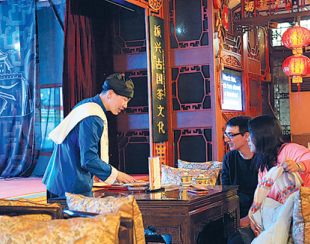 |
|
Lei Lei brings her friend Steven, from the UK, to experience the tea culture. [Photo by Liu Xuan/provided to China Daily] |
The popularity of the internet also made its presence felt, changing and expanding the type and scale of content people could enjoy.
Sports, films and TV shows came to China from around the world via the internet, giving people countless choices. In comparison, classical culture appeared somewhat old-fashioned.
The time span involved also lured potential audiences away, since the stories behind most of the classics took place in an age far removed from present-day life. And when the lines were spoken in classical Chinese, they were even harder to understand.
So, teahouses have had to adapt to save their business amid these cultural shifts.
Yin and her team turned to senior artists and experts to help find and preserve the traditional art forms and folklore. As a result, customers can now choose from Peking Opera, crosstalk (a traditional Chinese comedic performing art), storytelling, acrobatics, magic and other Chinese traditional performances.